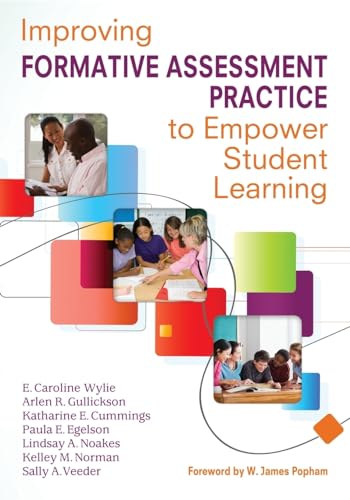Supercharge your formative assessment skills and watch student learning soar!
The authors describe an effective four-step process for improving teachers’ formative assessment practices that provides opportunities to reflect, consider alternative instructional approaches, and apply what they have learned. The text suggests that teachers ask themselves the same questions they ask students:
- Where am I going?
- What can formative assessment practice look like?
- Where am I currently in my formative assessment practice?
- How do I close the gap?
Included are case studies, examples of formative assessment in practice, and a companion website with tools and templates.
E. Caroline Wylie is a research scientist at Educational Testing Service. She holds a undergraduate degree in Applied Mathematics and Physics, a postgraduate certificate in teaching mathematics and information technology and a doctorate in educational assessment, all from Queen’s University, Belfast.
Her current research addresses issues of the use of formative assessment to improve classroom teaching and learning. She has been involved in projects that are focused on the creation of effective, scaleable and sustainable teacher professional development. Related research projects have focused on the formative use of diagnostic questions for classroom-based assessment, and the impact that the sustained use of such questions have on classroom instruction and student learning. Current work includes an investigation of how learning progressions can be used to support formative assessment in mathematics. Several of these projects have been supported by large grants, for which she been the principal investigator or co- principal investigator.
Previous work at ETS includes serving as the lead ETS developer of the National Board for Professional Teaching Standards (NBPTS) certificates for middle and high school science teachers and elementary school art teachers.
Arlen R. Gullickson, Ph.D., is professor emeritus at Western Michigan University. He served as The Evaluation Center director from 2002 to 2007 and as its Chief of Staff of from 1991-2002. Dr. Gullickson chaired the Joint Committee on Standards for Educational Evaluation from 1998 to 2008 during which time the Committee developed The Student Evaluation Standards (2002), revised The Personnel Evaluation Standards, Second Edition (2007), and was engaged in revising The Program Evaluation Standards, Second Edition (1994) for the 3rd edition published in 2010. He has worked extensively in education as a secondary math and science teacher, professor of educational research and evaluation, and in the conduct of federally funded research and evaluation projects. In 2011 he stepped down from directing an NSF funded Advanced Technological Education evaluation resource center (EvaluATE) to become its co-director. He has received several major service awards including: the Western Michigan University’s Distinguished Service Award (2002), the American Evaluation Association’s Alva and Gunnar Myrdal Evaluation Practice (2007), and the Consortium for Research on Educational Accountability and Teacher Evaluation’s Jason Millman Scholar award (2oo8). Although his primary work emphasis for the past 20 years has focused on program evaluation, he maintains a strong interest in classroom evaluation practices. He has authored numerous journal articles, book chapters and book materials. With Peter Airasian he authored the Teacher Self-Evaluation Tool Kit (1997) which presaged many of the ideas presented in this book.
Dr. Cummings earned a Ph.D. in Secondary Education with an emphasis in teacher preparation at the University of Illinois in 1989. Prior to that time, she was a high school teacher and counselor in Fargo, North Dakota. Cummings directed the secondary education program at North Dakota State University before moving to Western Michigan University in 1999. She has coordinated the School/University Partnership Team at WMU and was co-coordinator of the CITE Collaborative with Kalamazoo Public Schools in 2002-03. Currently, Cummings serves as the associate dean of the College of Education and Human Development at WMU and provides technical assistance in the assessment of student learning for academic and student services programs. Her research interests include the assessment of candidates in teacher education, the use of benchmarking to build assessment skills in preservice and in-service teachers, and program evaluation in higher education. Nationally, she has served as a member of the NCATE Board of Examiners and on the Association of Teacher Educators’ Commission on Teacher Induction and Retention.
Dr. Paula Egelson is the director of leadership research at the Southern Regional Education Board in Atlanta. She was formerly the director of the Center for Partnerships to Improve Education at the College of Charleston (SC).
Dr. Egelson has an undergraduate degree in child development, a master’s degree in reading education, and a doctorate in educational leadership. She has worked as a community organizer, a school improvement and literacy program director for a federally-funded educational lab, a K-8 classroom teacher, and as a reading specialist. Dr. Egelson has served as the principal investigator for several large literacy grants. She has a background in research and has developed teacher evaluation, literacy, high school performance assessment, class-size reduction, school improvement and English language learners products for PreK-12 educators.
Ms. Noakes is an Assessment for Learning research fellow in The Evaluation Center and a doctoral student in the Interdisciplinary Ph.D. Program in Evaluation at Western Michigan University. In this capacity, she is involved with the evaluation of numerous education programs in schools and communities. She is actively engaged in Assessment for Learning research and works toward helping educators implement research-based student assessment and evaluation practices in a variety of contexts.
Ms. Noakes holds a Master’s in Mathematics Education and has been involved in numerous educational reform projects and committees. As a classroom teacher for ten years, she has worked with students in grades 5 through 12 specializing in instruction for gifted and talented students. Lindsay currently focuses on work with preservice teachers.
